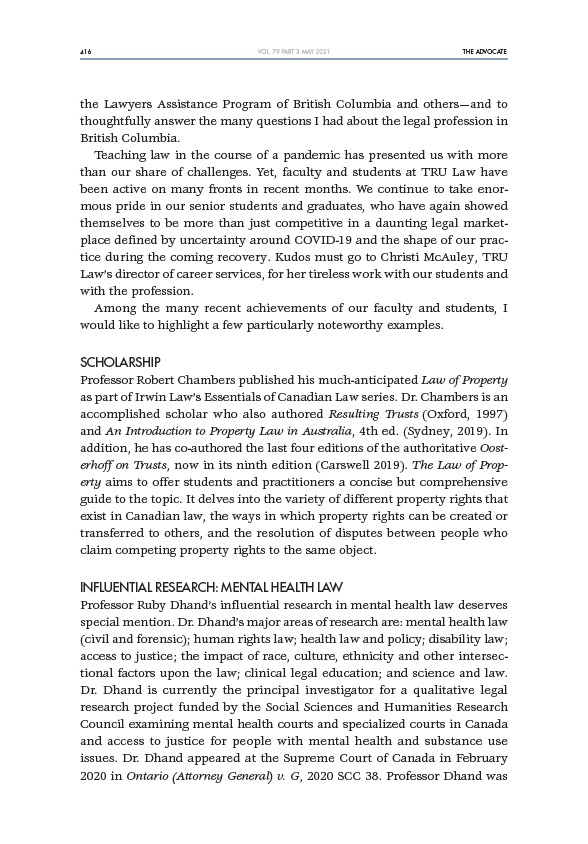
416 THE ADVOCATE
VOL. 79 PART 3 MAY 2021
the Lawyers Assistance Program of British Columbia and others—and to
thoughtfully answer the many questions I had about the legal profession in
British Columbia.
Teaching law in the course of a pandemic has presented us with more
than our share of challenges. Yet, faculty and students at TRU Law have
been active on many fronts in recent months. We continue to take enormous
pride in our senior students and graduates, who have again showed
themselves to be more than just competitive in a daunting legal marketplace
defined by uncertainty around COVID-19 and the shape of our practice
during the coming recovery. Kudos must go to Christi McAuley, TRU
Law’s director of career services, for her tireless work with our students and
with the profession.
Among the many recent achievements of our faculty and students, I
would like to highlight a few particularly noteworthy examples.
SCHOLARSHIP
Professor Robert Chambers published his much-anticipated Law of Property
as part of Irwin Law’s Essentials of Canadian Law series. Dr. Chambers is an
accomplished scholar who also authored Resulting Trusts (Oxford, 1997)
and An Introduction to Property Law in Australia, 4th ed. (Sydney, 2019). In
addition, he has co-authored the last four editions of the authoritative Oosterhoff
on Trusts, now in its ninth edition (Carswell 2019). The Law of Property
aims to offer students and practitioners a concise but comprehensive
guide to the topic. It delves into the variety of different property rights that
exist in Canadian law, the ways in which property rights can be created or
transferred to others, and the resolution of disputes between people who
claim competing property rights to the same object.
INFLUENTIAL RESEARCH: MENTAL HEALTH LAW
Professor Ruby Dhand’s influential research in mental health law deserves
special mention. Dr. Dhand’s major areas of research are: mental health law
(civil and forensic); human rights law; health law and policy; disability law;
access to justice; the impact of race, culture, ethnicity and other intersectional
factors upon the law; clinical legal education; and science and law.
Dr. Dhand is currently the principal investigator for a qualitative legal
research project funded by the Social Sciences and Humanities Research
Council examining mental health courts and specialized courts in Canada
and access to justice for people with mental health and substance use
issues. Dr. Dhand appeared at the Supreme Court of Canada in February
2020 in Ontario (Attorney General) v. G, 2020 SCC 38. Professor Dhand was